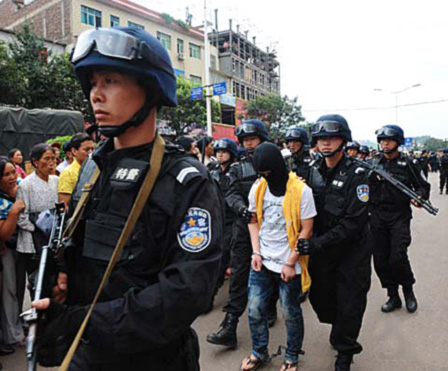Beijing: Surveillance cameras saw the 13-year-old boy sitting on a scooter with three classmates in the final moments before he passed away. His phone died an hour later, sparking a desperate hunt by family members.
The boy’s body was found the next day by authorities in a village in the Hebei region of northern China, hidden beneath a tarp in an abandoned vegetable greenhouse. The finding was heartbreaking.
In a case that has captured China’s attention, his three teenage classmates have been arrested on suspicion of killing the kid. This has sparked indignation, a heated debate about the defendants’ young ages, and introspection about bullying and social responsibility in rural China.
The youngster was identified by police in Handan City’s Feixiang area solely by his last name, Wang.
They said in a statement released on Sunday that the boy had died on March 10 and that the suspects had been taken into custody the day after. On Monday, a police investigator revealed to state broadcaster CCTV that the crime was planned, with the suspects excavating the pit twice—once the day before and once on the day of the murders.
In social media posts and interviews with Chinese media, Wang’s family and legal representative claimed that the kid had been bullied for a long time and had been coerced into giving money to a classmate before to his death. After looking over the security tape and speaking with the classmates, they reported that police had identified the possible killers.
“His body was beyond disfigurement, and he was beaten alive, acknowledgment,” Wang’s father posted on the Chinese social media network Douyin. “I hope the killers will pay with their lives, and that the government will be fair, transparent, and just in punishing them severely.”
The case will serve as a test for a 2021 legislation change that reduced the age at which minors could face criminal charges from 14 to 12.
Requests for comments from Wang’s grandma, aunt, and father went unanswered. The Associated Press was advised to wait for comment by a person who answered a phone line for their lawyer’s legal company, claiming they were inundated with demands for interviews. The boys’ school’s principal’s call rang unanswered, as did the numbers of two of the suspects.
All of the accused and the victim are younger than fourteen. According to media accounts, these children were “left-behind,” a term used to characterize children in rural areas who frequently get care from grandparents as a result of their parents’ employment in distant cities.
Concerns about the social and psychological wellbeing of these kids, their exposure to violent content online, and the capacity of the nation’s social services to provide for them resurfaced as the tragedy’s specifics became public over the weekend. Wang’s family’ posts and videos received millions of views and thousands of comments.
Weibo is a Chinese social media platform. A commentator on the platform stated that “the attention paid to the mental health of minors in the countryside is too little.” “I believe that this kind of event could occur once more.
Wang’s death is the most recent in a string of juvenile murder cases in China that have spurred discussion about the age at which a kid should be held accountable for a crime, according to Zhang Dongshuo, a defense lawyer in Beijing who is not involved in the case.
These incidents involving kids are generally uncommon, according to Zhang. However, a growing number of these incidents have been covered by the media recently, which has sparked debate over raising the age of criminal culpability in Chinese culture.
Since only people over the age of 14 could be prosecuted in China at the time, a 13-year-old boy who admitted to sexually abusing and killing a 10-year-old girl in 2019 escaped legal action.In a video posted on Monday, Wang’s father said that the sight of his son’s body was “crueler than I imagined.” “Your father isn’t scared, he is only upset and furious,” Wang’s father wrote, addressing his son. “Wait for your father to avenge you!” ___Police asked the public not to spread rumors in order to protect the victim’s privacy and avoid further harm to the boy’s family.

